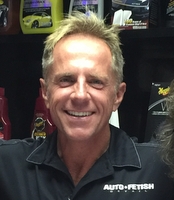How to Polish a Car:
Beginners Guide to Success!
Learning how to polish a car as a beginner will prove a bumpy road! As you will find yourself overwhelmed very quickly with the endless opinions of so-called experts!
- What is the best way to buff a car?
- Is buffing the same as polishing?
- Should you polish by hand or use a machine?
Any search on the Internet about polishing a car will deliver a mind-numbing amount of results.
From the best car polish to the best car buffer, you will simply find yourself drowning in this digital age of free information. And unfortunately, you will not have enough experience or knowledge to know good information from bad information.
This hyped-up industry and the so-called experts will have you chasing your tail from one product to the next, using one technique over another.
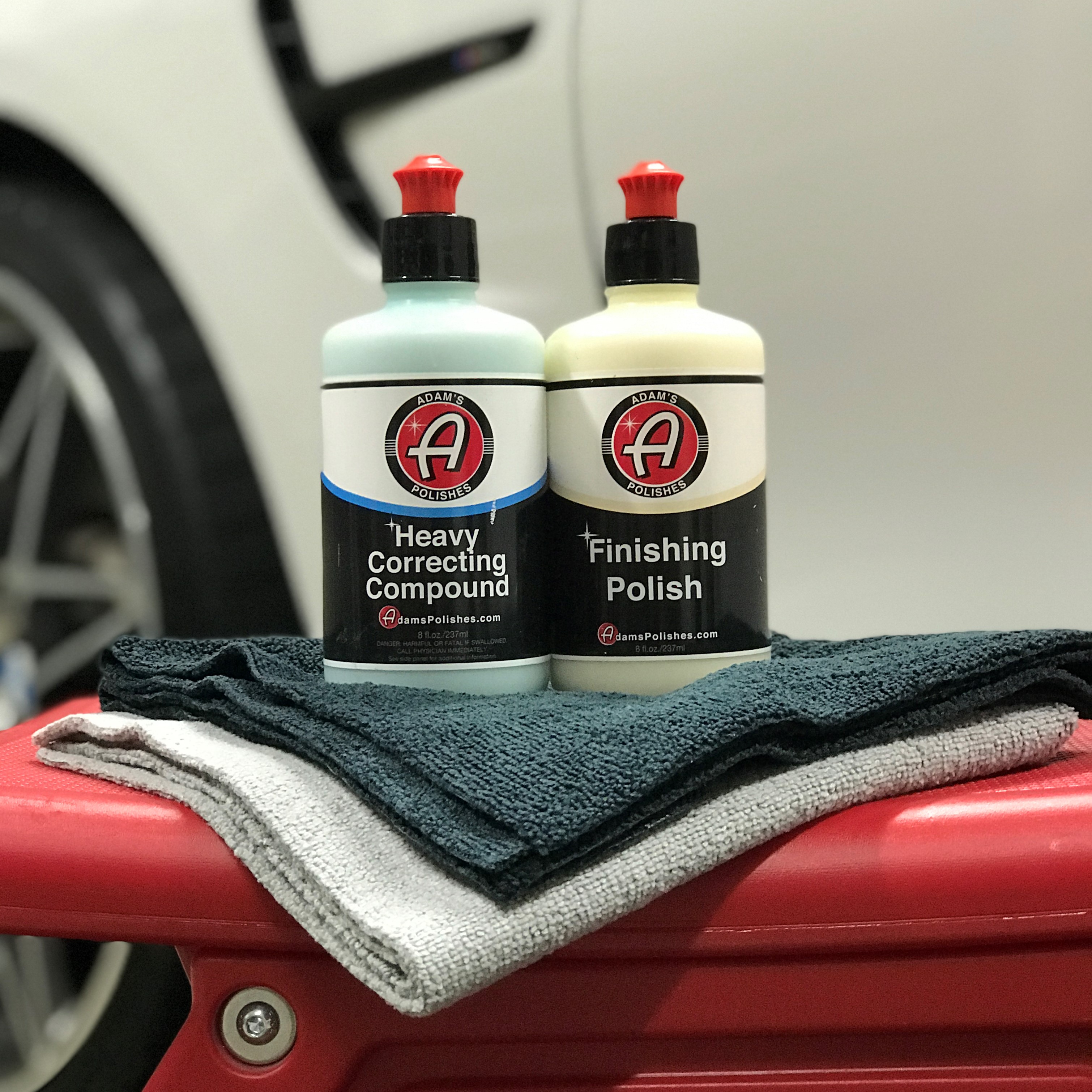 Adam's car polishes represent outdated technology in the way of car polishes and compounds
Adam's car polishes represent outdated technology in the way of car polishes and compoundsWhat You Need to Know First:
Before polishing a car
The first thing you need to know as a beginner is that the industry likes you being confused and ignorant.
And if for some reason you don't consider yourself confused, then consider yourself lucky!
Most of you reading this have already started on this path and realize how confusing this topic is.
Confusion and ignorance are the industry's weapons of choice. Weapons they use to separate you and your money.
Sophisticated jargon, sexy terminology, hype-up marketing, and flashy labels separate all of us from our money in the name of "stuff".
Stuff, stuff, and more stuff! But this industry as a rule does nothing to educate and inform you along the way.
I want you to become an informed car owner and an educated consumer. I believe educated people make better decisions.
And to do this I will be answering the questions you aren't asking, and don't even know to ask in the first place.
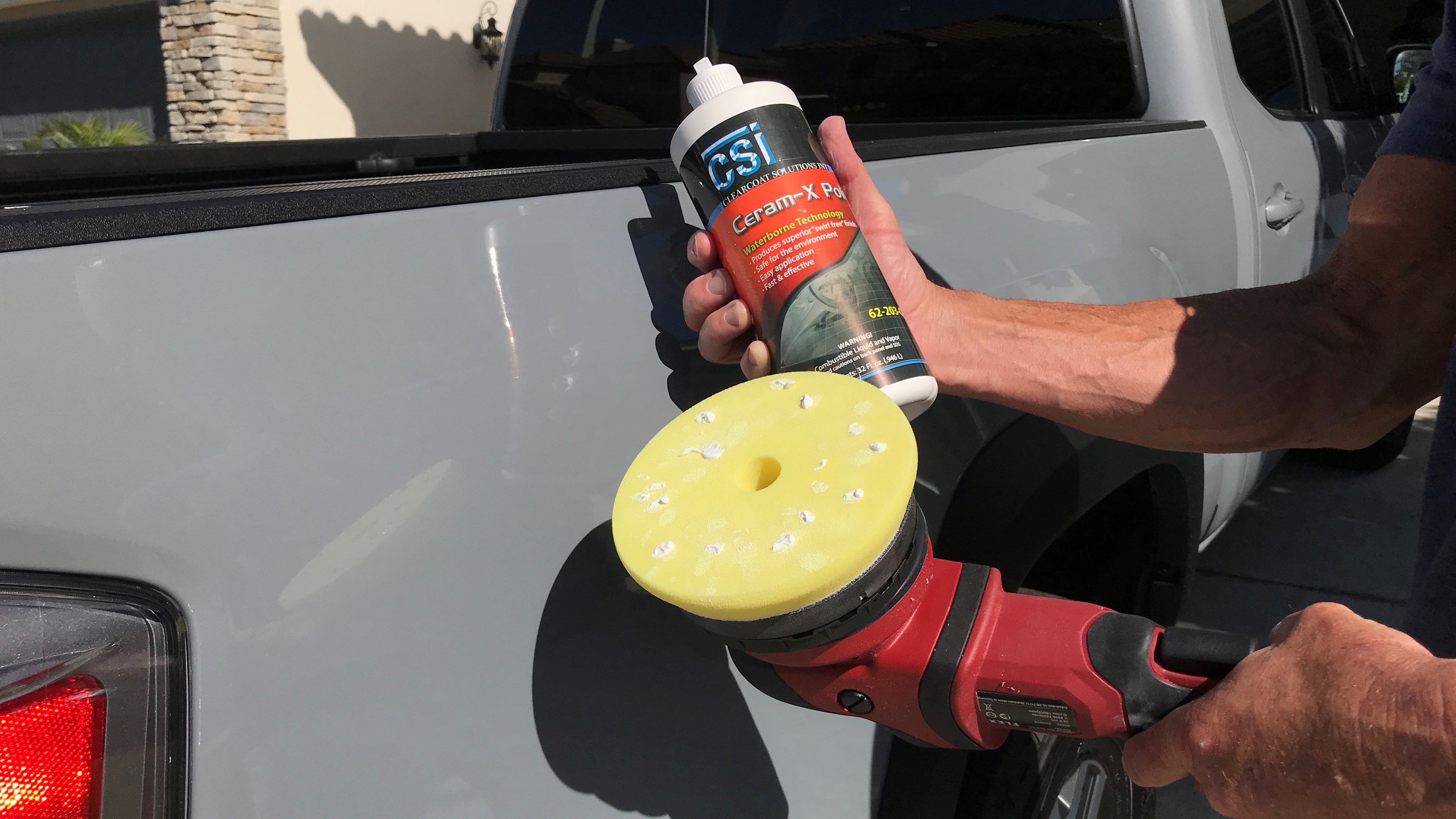
Do You Really Want to Polish Your Car?
Before you start asking what is the best way to polish a car, or which buffer is the best buffer, or which polish is the best car polish, let me ask you if you really want to polish your car at all????
....my guess is that you really just want a shinier car.
"Shine Reigns Supreme!"
An Internet search for the best ways to polish your car is a great place to start, but the reality is that you probably don't actually want to polish your car, you probably just want a really shiny car!
Specifically, you want really shiny paint on your car.
Most people just simply accept that in order to get shiny paint, you gotta polish your car.
And polishing a car is all about creating shine. Lots and lots of shine! More shine the better!
Best Car Polish
What Would Darren Do
I accept that life is busy and you may not have the time nor the desire for a deep dive into the subject of polishing a car.
Often people simply want to know what it is that I would do if I were them.
"Darren, I don't have time to learn everything, I just want to know what you do or what you use!"
And for this reason I will start with what I use professionally in every situation, every time, on every car, regardless of whether I am polishing by hand or machine.
Ceram-X Car Polish

CSI Ceram-X Car Polish 62-203-Quart - Single Product Polish (SPP) Superior Single Polish Replaces The Countless compounds/Polishes You Think You Need
- The original Single Product Polish (one polish to go from heavy defect removal down to a swirl free finish)
- Uses highly refined, controlled abrasives (the industry norm is to use diminishing abrasives that break down inconsistently and unevenly)
- Safe for all paint/clear coat types
- True waterborne technology (does not rely on traditional heavy solvents that can swell paint and cause damage)
- Can be used with hand or machine, any buffer, any buffing pad type
Darren's Tips: When you start searching for the best car polish, your head will begin to melt from an overwhelming amount of options. I have relied on Ceram-X for over 15 years as a professional. Despite testing countless compounds and polishes, I always default to Ceram-X and has become what I call my "sure thing".
Any car, any color, any paint type.
Detailing Micro-fiber Cloths

Chemical Guys MIC_506_12 Professional Grade Premium Microfiber Towels, Gold (16 Inch x 16 Inch) (Pack of 12)
- Micro-fibers are superior in every way regardless of what you are doing!
- Winning balance between cost, weight, and size
- The softest type of cloth for your paint
Darren's Tips: If there is a subject that could possibly more overwhelming than car polish, the world of micro-fibers might be it. There are literally endless choices!
The most critical thing you need to know is that micro-fiber are the superior cloth regardless of the detailing/cleaning job you are performing.
And just like any other area of cosmetic car care, you don't have to get bogged down overthinking things at the beginning. There is plenty of time for that later.
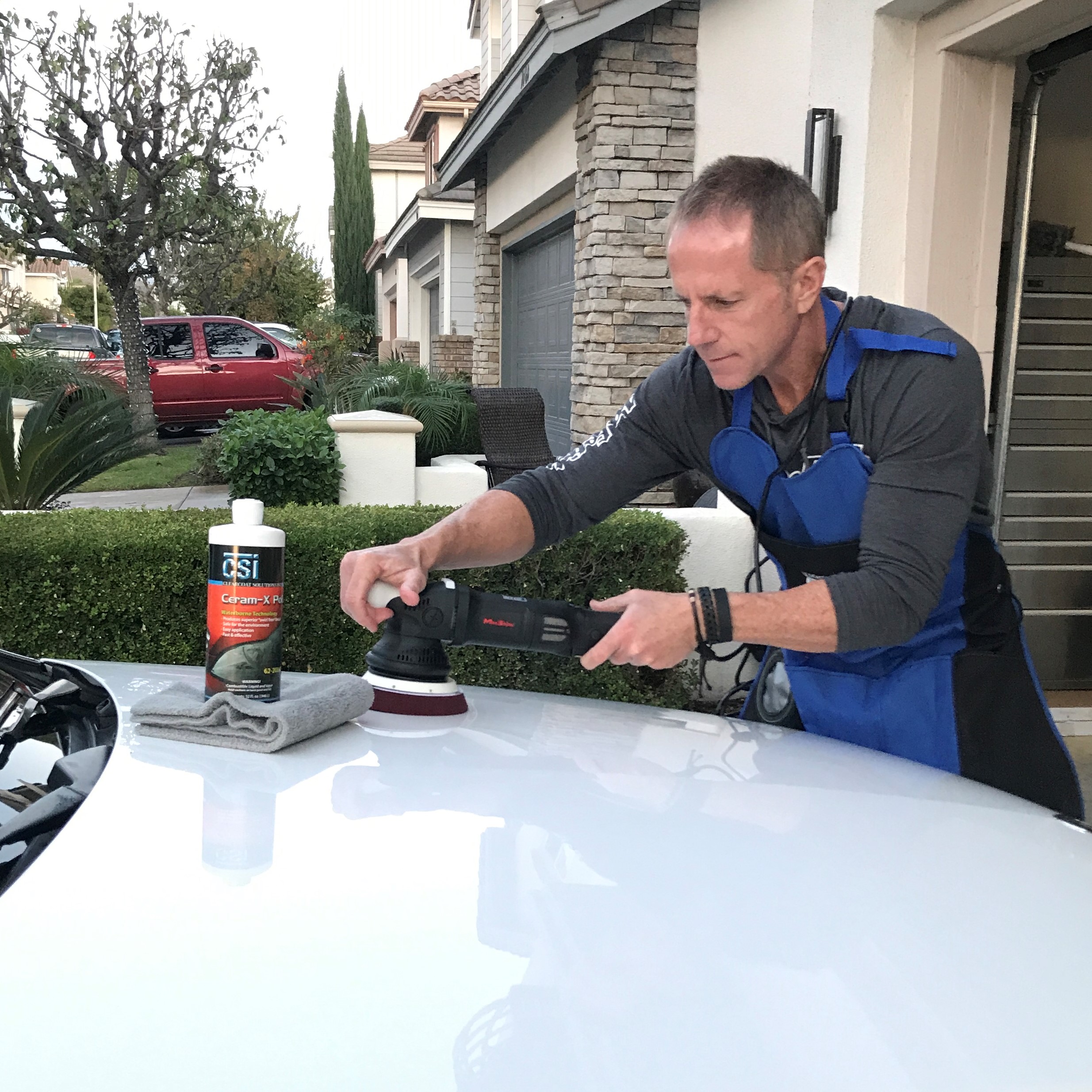
Polishing a Car:
paint enhancement vs. paint correction
As a car owner, you have two fundamental choices to create shine. And these can be reduced down to temporary shine, versus permanent shine.
Temporary shine is the world of car waxes, car sealants, quick detailers, and gloss enhancers.
Permanent shine is the world of compounds and polishes.
Which brings me back to the fundamentals of polishing your car to create shine.
"The only way to produce lasting gloss, shine, and depth at a permanent level, is through the use of abrasive technology"
But what is abrasive technology?
Abrasive technology is simply a term used when talking about products that use some type of abrasives -in the form of compounds and polishes- to refine the surface of your car paint while also removing imperfections to create the best reflective surface.
Most people looking to polish a car do so based on two basic strategies:
- Create shine
- Remove imperfections in paint
Creating shine is very easy!
But easy as a rule is also very temporary. If you want easy shine, you can simply add a coat of car wax or paint sealant and call it quits.
If you are looking to create a better reflective surface by restoring shine and defect removal, you will be required to use a compound or polish that have abrasives.
I am not a fan of compounds due to numerous factors:
- Compounds rely on diminishing abrasives (diminishing abrasives break down at uncontrolled rates)
- Compounds are more aggressive than any beginner would ever want
- Compounds mean you will also be required to buy a separate polish to finish with
- Compounds are often made with heavy solvents that are not friendly to your clear coat/car paint (while clear coat is different than what you might think of as car paint, it is irrelevant since your car will have a clear coat and clear coat will be what you will be polishing as the top layer of any factory paint job)
What is Difference Between Clear Coat and Car Paint
Clear coat and car paint will be forever confusing to any beginner. There is a physical and chemical distinction between the two materials.
The confusion is due to people using the two different terms to describe the same thing: The uppermost layer of a car paint system.
Technically there is a difference between what most people would label as car paint, and the actual clear coat that will be part of any factory produced car as part of the overall paint system.
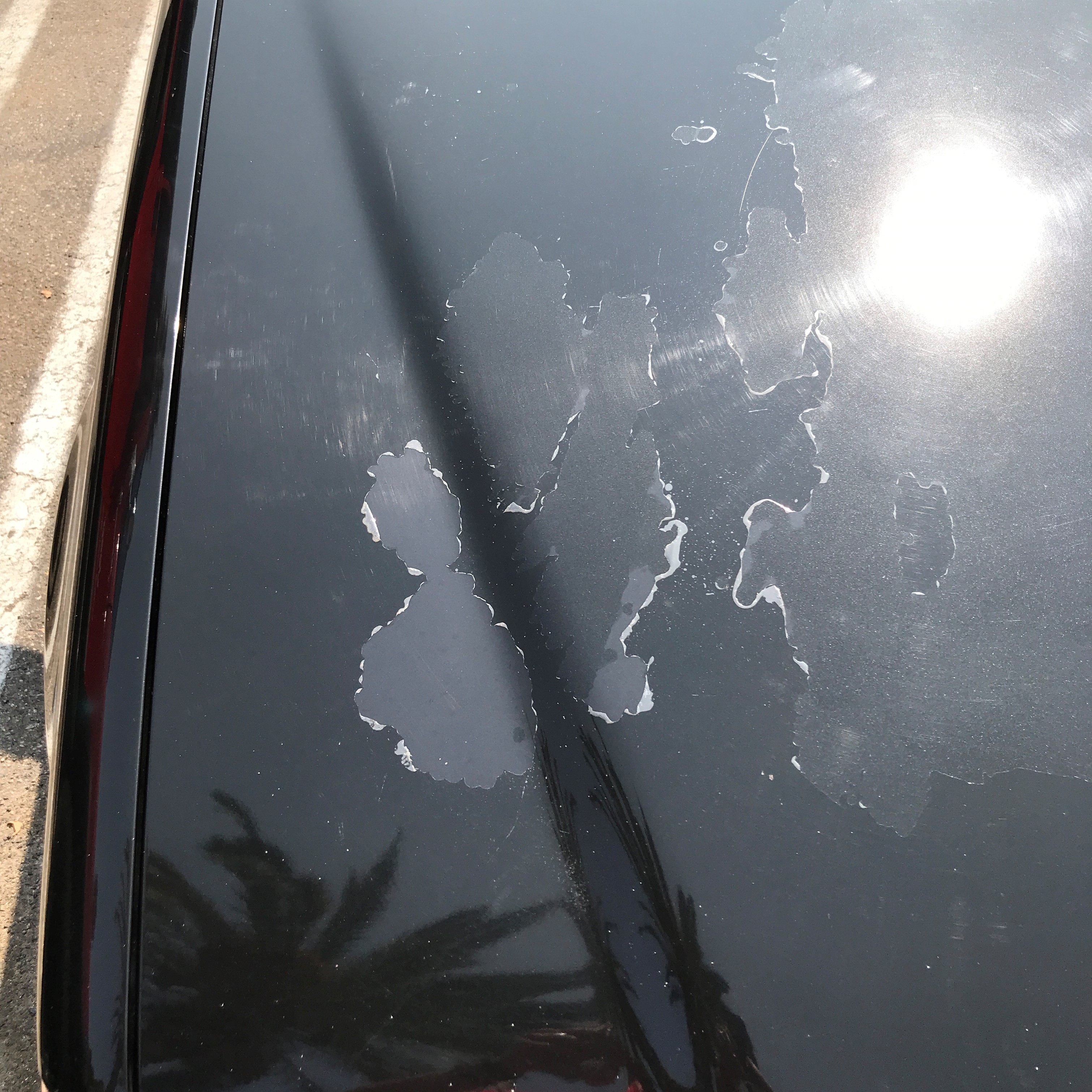 Clear coat failure that highlights the difference between the car paint that sits below the layer of clear coat on this 1999 Mercedes Benz with black metallic paint.
Clear coat failure that highlights the difference between the car paint that sits below the layer of clear coat on this 1999 Mercedes Benz with black metallic paint.I say "paint system" since the finish on your car will be a series of layers that are all part of the overall paint system. Most people associate car paint with color of some kind.
Kinda like you would never say that you are going to paint the walls in your house clear, you also would never say you want to buy a clear coat, but a blue car or a white car.
But the walls of your house are not finished with a clear coating like your car is. Despite there being a difference, in the end it really doesn't matter since clear coat and "car paint" need the same care and maintenance, and the same products you would ever use on "car paint" would also work on car clear coat.
How Thin is Clear Coat
Very thin!
In simple terms this means that you have no control over how thin or thick the factory clear coat is on your car. What you do have control over is how you decide to maintain your car as an owner.
Literally every time you touch your car as far as washing, drying, waxing, or polishing will in some small degree, make your clear coat progressively thinner and thinner.
But before you freak out, let me outline what you do need to know when it comes to your car clear coat in the context of polishing a car:
- Clear coat is good
Clear coat adds a layer of protection to the color coat. This means you want to take care of it just like you would old school paint jobs -if you are even old enough to have been around during those years.
- Clear coat is Thin
You have no control over the thickness of the clear coat on your car, you only have control over how to maintain your car, and more specifically, how you polish a car. if you accept that you want to refine the surface of the clear coat on your car through polishing, and decide that abrasive polish is the only really way you will be able to remove or reduce imperfections, then polishing a car will not be something you will want to do more often, but actually polish your car as less often as possible.
- What Does Clear Coat Do
Clear coat serves 3 basic purposes:
- Overall protection to the underlying color coat
- Additional gloss, shine, and depth to the underlying color coat
- Filters out UV rays to help prevent fading and degrading of the underlying color coat
The most important thing to be concerned with is clear coat thickness. There are chemicals within clear coat formulations that filter out UV rays, but the thickness of the clear coat itself is just as important as the ingredients in the clear coat.
This means you will always be fighting the battle as to making your car look better in the way of polishing your car, and knowing that every time you touch your car, you will continue to thin out the original clear coat.
Polishing by Hand or Machine:
Which is better?
What you need to understand first and foremost is that you will be scratching your way to success by using some type of abrasives that have been formulated into a compound or polish.
Understanding the difference between a compound and polish is in itself, another comprehensive discussion you may want to investigate further.
I accept that if you truly are a beginner in all sense of the word, that the thought of using any type of abrasives on your car paint will sound incredibly scary.
Just know that if you follow along, I will show you the safest, simplest, and quickest way to produce professional results even as a complete beginner.
What you need to understand first and foremost is that you have two basic choices as to how to physically polish a car-
Polish a Car by Hand:
- The "safest" way to polish a car
- The least "effective" way to polish a car (you will never be capable of producing the same results by hand that you can by a machine car buffer)
- Less "moving" parts (just your hand, a buffing cloth, and some polish)
- Inferior results
Polish a Car by Machine:
- Requires more commitment (finding the best car buffer, learning how to use a buffer, managing a buffer)
- Provides superior results when compared to polishing by hand
- Actually much easier than most people imagine
- Virtually as safe as polishing a car by hand (despite what you may have heard elsewhere)
Darren's Tip: The industry now has machine buffers and car polishes that are far superior than the outdated technology of decades previous. No longer do you have to sacrifice results out of fear of using a buffer to polish your car.
I recommend any beginner use a random orbital car polisher to begin with. Don't think that buying an using one of these polishers you are using a "toy" and that you will be required to buy an "adult" car buffer at some point in the future.
An entry level car buffer will prove incredibly effective. As a beginner I don't think you need to get weighed down by an endless search for the best car buffer.
These buffers are used by experienced professionals everywhere including myself. You can see what buffers I recommend at Orbital Buffers.
Polish a Car:
Scratching your way to perfection
It is said that good is the enemy to great. But when it comes to clear coat and your car, sometimes good enough is the better way.
And I accept that many of you reading this -those perfectionists out there- will find that good enough is for people with low standards.
Most beginners will be seduced into striving for perfection. You will chase perfection down a path that is simply unsafe when it comes to you and your car's clear coat.
99.9999 percent of you will be polishing clear coat. (clear coat will be the top layer to any factory paint job)
If you accept that you are scratching your way to success through the use of abrasive compounds/polishes, then you will also have to accept that you will be intentionally thinning out your clear coat as part of the process when you polish a car.
Clear coat is limited. You only have a certain thickness of clear coat in which to polish. What this also means is that you will want to polish less often, not more often.
Which then also means that if you go chasing perfection during the process of buffing your car, you will necessarily be thinning out your clear coat with your pursuit of perfection.
This will come at a cost.
Clear coat thickness is a key factor in clear coat's ability to filter out UV lighting. The thinner your clear coat is, the less effective it is at protecting against harmful UV light.
Clear Coat serves 3 critical purposes:
- Overall protective layer against the many assaults of life (dirt, water, bird poop, tree sap, air pollution, etc.)
- Filters out UV light rays (the thickness as well as the chemicals in clear coat determines how effectively UV light is filtered out)
- Creates additional shine, depth, and gloss as part of the overall paint system of your car
It should be immediately "clear" (pun intended) that the thickness of your clear coat is a fundamental rule. The thicker the better.
The thicker your clear coat is, the more effective it will be at protecting the color coat from degrading and fading. You cannot control how much clear coat has been put on, you can only control how much clear coat you take off.
This means that you want to retain as much of its original thickness as possible. Which brings me full circle in saying that the pursuit of perfection, at the cost of diminishing your clear coat is a legitimate trade-off to factor in when polishing a car.
Polishing a Car:
Clear coat safe products
Labeling products as "clear coat safe" is simply a way manufacturers try and make their product appear more specialized than another product.
This is simply a way of creating doubt in your head, then exploiting this newly created doubt to sell you their product, over that of their competitors.
Any car wax, car polish, or compound that can be used on clear coat, is also safe for use on any other type of car paint. It matters not. It is more about finding the most appropriate or effective product or tool than it is about whether it is actually safe or not.
How to Tell if Your Car Has Clear Coat: It will! Any car produced in the past 15 years will have a clear coat as the top layer of any paint system. The only exception will be limited to non-metallic white paint which is typically only found on trucks, or commercial equipment painted white. These cases are extremely rare.
Does Every Car Have Clear Coat:
How do you know if your car has clear coat?
The really short answer: Yes!
The "less-than-really-short" answer would be this: it doesn't actually matter.
Let me explain....
Clear coat or no clear coat, you want to protect your "paint". Since virtually every car will be finished with a clear coat, you will actually be working on a clear coat, not what many of you would consider traditional car paint.
When most people think of car paint, they think of a color. Yes your car has colored paint on it, but this colored paint its below your clear coat. Which then leads me to say, that in the context of this page, we are officially talking about clear coat, rather than car paint. (gets pretty confusing doesn't it)
Just know that 99.99% of cars made in the past 30 years will have a clear coat as the top layer of the overall paint system.
Any product that has been used by you in the past, but does not clearly say it is clear coat safe, is already clear coat safe. As I commented above, this is simply a tactic of the industry to create doubt, suspicion, and fear by exploiting your ignorance to sell you their product, versus another product.
If a product says clear coat safe, and you are not sure if your car has clear coat (it does), then you will play this game in your head called "what if".
What if my car has clear coat and I choose a product that doesn't say it is clear coat safe, and then something goes wrong.
Therefore I better choose a product that says it is clear coat safe just to be...wait for it...safe!!
Thia industry, like virtually every other industry, uses hype and misleading marketing to separate you from as much of your money as possible.
How to Polish a Car for Beginners Summary
I hope I have done a good job at educating you rather than confusing you!
Virtually every topic of detailing and cosmetic car care will deliver a mind-blowing amount of tangents to wander off on. I am sincere when I say that I want you to become a more informed consumer and educated car owner.
The better understanding you have, the better chance you have at making more appropriate choices in your world of car care.
I hope you come back soon!
Sincerely,
Darren Priest
|
|
